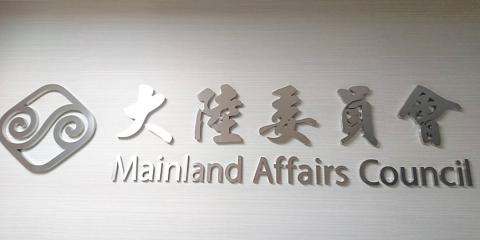Most Taiwanese do not agree with China’s “one country, two systems” formula for unification and believe the nation’s future should be decided by its people, a survey released by the Mainland Affairs Council (MAC) on Thursday showed.
In the survey, which was conducted by National Chengchi University’s Election Study Center from Wednesday to Sunday last week, 79 percent of respondents rejected the “one country, two systems” concept, which would make Taiwan a special administrative region of China.
Only 10.4 percent of respondents accepted the formula, while 10.5 percent said they had no opinion.

Photo: Chung Li-hua, Taipei Times
The government has already taken countermeasures against a five-point proposal announced by Chinese President Xi Jinping (習近平) on Jan. 2, council spokesman Chiu Chui-cheng (邱垂正) said, adding that the results of the survey proved that Taiwanese oppose China’s propaganda and divisiveness.
Meanwhile, 83.9 percent of respondents rejected the use of force by China against Taiwan, while 87.7 percent said that Taiwan’s future and cross-strait relations should be decided by Taiwan’s 23 million people.
The survey also found that 83.9 percent support exchanges between Taiwan and China being undertaken on the basis of equality and mutual respect, without political preconditions and based on the law.
Eight out of 10 respondents said that the government should have better legislative and monitoring mechanisms before engaging in political negotiations or signing agreements with China.
Almost 90 percent of respondents said that the “status quo” across the Taiwan Strait should be maintained.
The telephone survey collected data from 1,093 people aged 20 or above. It has a margin of error of 2.96 percentage points and a confidence level of 95 percent.

Chinese spouse and influencer Guan Guan’s (關關) residency permit has been revoked for repeatedly posting pro-China videos that threaten national security, the National Immigration Agency confirmed today. Guan Guan has said many controversial statements in her videos posted to Douyin (抖音), including “the red flag will soon be painted all over Taiwan” and “Taiwan is an inseparable part of China,” and expressing hope for expedited reunification. The agency last year received multiple reports alleging that Guan Guan had advocated for armed reunification. After verifying the reports, the agency last month issued a notice requiring her to appear and explain her actions. Guan

GIVE AND TAKE: Blood demand continues to rise each year, while fewer young donors are available due to the nation’s falling birthrate, a doctor said Blood donors can redeem points earned from donations to obtain limited edition Formosan black bear travel mugs, the Kaohsiung Blood Center said yesterday, as it announced a goal of stocking 20,000 units of blood prior to the Lunar New Year. The last month of the lunar year is National Blood Donation Month, when local centers seek to stockpile blood for use during the Lunar New Year holiday. The blood demand in southern Taiwan — including Tainan and Kaohsiung, as well as Chiayi, Pingtung, Penghu and Taitung counties — is about 2,000 units per day, the center said. The donation campaign aims to boost

The Kaohsiung Tourism Bureau audited six hotels in an effort to prevent price gouging ahead of Korean band BTS’ concert tour in the city scheduled for Nov. 19, 21 and 22 this year. The bureau on Friday said that the audits — conducted in response to allegations of unfair pricing posted on social media — found no wrongdoing. These establishments included the local branches of Chateau de Chine, Hotel Nikko, My Humble House, and Grand Hai Lai, it said, adding that the Consumer Protection Commission would have penalized price gougers had the accusations been substantiated. The bureau said the Tourism Development Act

The Central Weather Administration (CWA) said a magnitude 4.9 earthquake that struck off the coast of eastern Taiwan yesterday was an independent event and part of a stress-adjustment process. The earthquake occurred at 4:47pm, with its epicenter at sea about 45.4km south of Yilan County Hall at a depth of 5.9km, the CWA said. The quake's intensity, which gauges the actual effects of a temblor, was highest in several townships in Yilan and neighboring Hualien County, where it measured 4 on Taiwan's seven-tier intensity scale, the CWA said. Lin Po-yu (林柏佑), a division chief at the CWA's Seismological Center, told a news conference